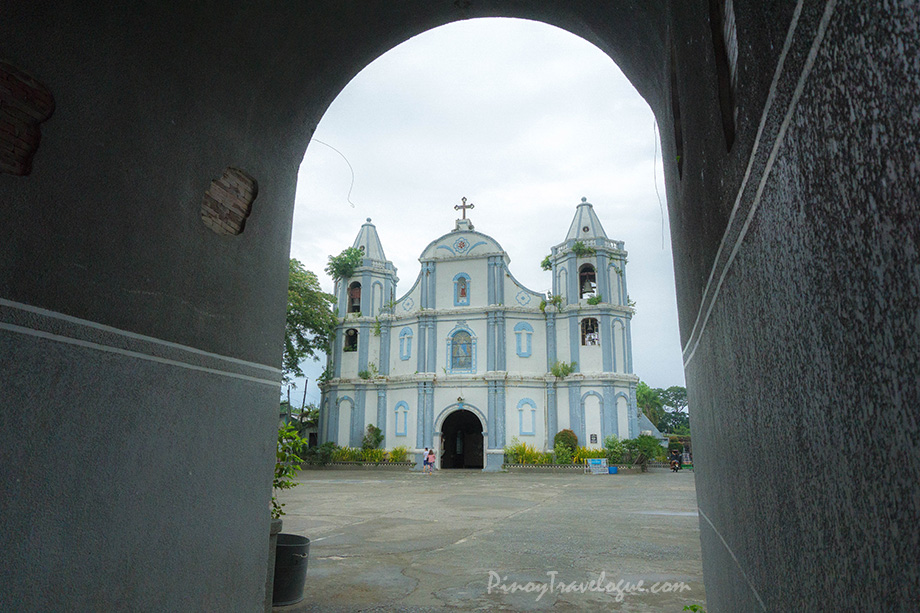 |
| Namacpacan Church in Luna, La Union |
Too early to check in at the lodge in San Juan where we would spend the night, we drove north for another half hour to Luna for some of the town's tourist sites and to have the first meal of the day there. It was only around seven.
Along the sleepy highway, we passed by a signage pointing to Kamay na Bato Art Gallery but decided to hold our horses and went straight to the town center. Gone slightly out of way, the road finally turned busy with contiguous houses and still closed shops, and some vehicles moving off at a roundabout.
At the middle of this traffic rotary stands a statue of a mounted warrior clad in colonial uniform, easily identifiable for his iconic handlebar mustache. It was of Gen. Antonio Luna, giving us a salute as we enter the town named in his family's honor. "Namacpacan" was the town's former name, Gen. Luna's mom was a native.
READ ALSO: San Juan Surf Town: Surfing and Everything in Between
 |
| Antonio Luna's statue at the rotunda |
We pulled over a few blocks from the rotunda for breakfast. I grabbed my camera and took a stroll around the vicinity to while away the time it would take to prepare the feast we ordered from one of the few opened diners around.
Downtown Luna has an old-world charm. It manifests Spain's heritage in the country. Few steps from the restaurant was the town plaza and the municipal hall whose structure resembles that of Casa Real of the Taal Heritage Town in Batangas. Across the road, adjacent Luna's Tourism Office, the centuries-old Namacpacan Church faces the munisipyo. It was common during the Spanish colonial era that the town's church and the town hall stood facing each other at the heart of the town's central district.
READ ALSO: Notable Spots of Taal Heritage Town, Batangas
 |
| Luna Municipal Hall |
 |
| At Luna's town plaza, glimpse of Namacpacan Church on background |
Luna Church's history dates back to 1690 when the Spaniards founded the town and the first church was built in Darigayos, a coastal barrio in Luna, not so far from the site of the present church erected in 1741.
It has an imposing façade, with thick walls painted in blue and white. Its interiors are in contrast with its age, apparently restored and has since maintained. Its structural features fall under the Baroque architecture. The country's cultural agency declared the church as a National Cultural Treasure.
 |
| National Cultural Treasure marker |
 |
| Facade of Namacpacan Church |
 |
| Interiors of Namacpacan Church |
Namacpacan Church is home to Apo Baket, the vernacular title given by the natives to a six feet and four inches tall wooden image of the Blessed Virgin Mary enshrined at the church since 1872. Apo baket is how locals call elderly women as a sign of respect.
READ ALSO: Tangadan Falls, Elyu's Iconic Water Cascade
En route to Vigan in Ilocos Sur, the galleon ship that carried the statue from Spain was caught in a storm and took shelter in the port of Darigayos. When the weather calmed down, the ship continued her journey, but unexpected strong winds forced her to return. The captain then decided to transport the image from Darigayos to Vigan by land but, according to accounts, became inexplicably too heavy to transfer over.
Namacpacan's parish priest back then interpreted the series of incidents as a sign that the image was meant for the town, so he requested the friars in Vigan to let the image stay. The townspeople agreed to pay the cost incurred, and their church became the Shrine of Our Lady of Namacpacan.
 |
| Luna's town boundary arch |
 |
| A local devotee at the image of the Our Lady of Namacpacan |
Namacpacan Church has its share of stories of miracles attributed to their revered patroness. There were accounts of apparitions where Apo Baket, disguising as an old lady, gives help to the natives while requesting them to visit the church and get baptized. A teenage girl who was born lame, getting her ability to walk restored after an old woman visited her at home asking for food and drinks.
Pope Pius XII, the head of the Catholic Church during the World War II, dreamed about the Our Lady shortly before his death in 1958. When he asked his staff upon waking up where Namacpacan was, no one could give an answer since it was a remote town in the Philippines. The answer was obtained only after the pope's death. Vatican City canonically crowned Apo Baket in 1959.
 |
| Statue of the Our Lady of Namacpacan |
Our Lady of Namacpacan is the patroness of Ilocano travelers. Pulling out the Ilocano card in me (my mom's an Ilocana), I whispered gratitude and asked guidance for our entire La Union trip then bailed out. It's chow time. Luna's pebble beach, Baluarte watch tower, and Kamay na Bato afterwards.
READ ALSO: Luna's Baluarte Watchtower and Pebble Beach
 |
| Luna's Tourism Office |
How to Get to Namacpacan Church
From San Fernando or San Juan, take a jeepney and alight at Luna's town center. Fare is around PHP 30, less than an hour of travel time.


